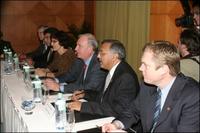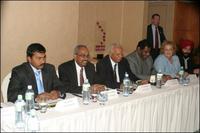Canadian PM meets with TNA, TRO delegations
[TamilNet, Monday, 17 January 2005, 14:30 GMT]
Mr. Paul Martin, Prime Minister of Canada, met with delegations of Tamil National Alliance (TNA) and Tamils Rehabilitation Organisation (TRO) Monday at Colombo Hilton Hotel at 2.30 PM. The TNA delegation urged that all international aid, including Canadian aid, to be channeled through International Non-Governmental Organizations till a proper mechanism is set up to deal with the post Tsunami situation in the Northeast. The TNA told the Canadian Prime Minister that there was total centralization of all rehabilitation, resettlement, reconstruction and development activities in Colombo, and that this was totally inconsistent with the wishes expressed by the people of Northeast.
Full text of the press release issued by the Tamil National Alliance follows:

17 January 2005
PRESS RELEASE
A delegation of the Tamil National Alliance (TNA) met with Rt. Hon. Paul Martin, Prime Minister of Canada. Also present were Hon. Ujal Dosanjh Minister for Health of the Canadian Government, Her Excellency Valerie Raymond High Commissioner for Canada in Sri Lanka, nine Members of Parliament of Canada, and several senior Canadian Officials.
The TNA delegation comprised of Mr. R. Sampanthan M.P. Parliamentary Group Leader, Mr. Joseph Pararajasingham M.P. and Mr. Gajendrakumar Ponnambalam M.P. Also present was Mr. K. P. Reggie, Executive Director of the Tamils Rehabilitation Organization.
After a brief introduction the Canadian Prime Minister expressed the desire to hear the TNA.
The TNA impressed upon the Prime Minister that the Tsunami had struck, when the Tamil speaking people dislocated by the two decade-long conflict had not yet been resettled and rehabilitated despite three years of ceasefire, and that the Tsunami had added immensely to the woes of the Tamil speaking people.
The worst affected were the fishing community who were subjected to severe restrictions during the period of the conflict and even during the period of the ceasefire.

More than 2/3rds the deaths, the dislocated people and the houses, boats and fishing equipment destroyed was in the Northeast, and that the Tsunami had reduced the affected persons to a totally helpless position. It is necessary to ensure that these affected persons in the Northeast were adequately provided for.
Sri Lanka as in Canada has distinct linguistic areas. The Northeast is predominantly Tamil speaking, despite the extensive Sinhala colonization that had taken place after independence, while the rest of the country was predominantly Sinhala speaking.
It is necessary to ensure that the Tamil speaking Northeastern region received an equitable proportion of the international aid, in a manner commensurate with the damage suffered.
A mechanism needs to be set-up in the Northeast to deal with the post Tsunami situation. Until such a mechanism is set up, in the context of our unpleasant past experiences, we would strongly urge all international aid, including Canadian aid, to be channeled through international Non-Governmental Organizations or, that such aid should be allocated for identified projects. It is only by so doing that the Northeast will be assured of an equitable share of the international aid. We have every reason to be skeptical about the Northeast receiving an equitable share of the international aid unless such a procedure is adopted.
The TNA impressed upon the Canadian Prime Minister that there was total centralization of all rehabilitation, resettlement, reconstruction and development activities in Colombo, and that this was totally inconsistent with the wishes expressed by the people in the past four decades and particularly at the last General Election, when the TNA on the votes cast in the Northeast elected 22 members to Parliament. The total number of seats assigned to the Northeast was 31. This was akin to Ottawa making all decisions in regard to a post natural disaster situation in Quebec. Such centralization of authority was totally obnoxious and unacceptable. Moderate Tamil political leadership had sought a federal arrangement for more than 50 years, but successive governments have failed to deliver. In fact successive governments have unilaterally abrogated pacts entered into with moderate Tamil political leadership.
The government also made decisions that were not conflict sensitive such as the deployment of the Armed Forces who are almost 100% Sinhala to take over Welfare Centers occupied by Tamil people, despite their horrendous experiences at the hands of the armed forces during the period of the conflict. This resulted in Tamil people vacating the welfare centers though they did not have homes to return to. There is an imperative need, if the government wants the post Tsunami efforts to succeed, to look at the position in the Northeast differently.
There is also a need too fully involve the LTTE and the TRO in the activities related to the post Tsunami situation in the Northeast. The LTTE and the TRO have been engaged in delivering effective and efficient services to affected people in the Northeast during the period of the conflict, and from the moment the Tsunami occurred. This is acknowledged by the people of the Northeast and independent foreign observers, despite the efforts of some chauvinistic forces to demonize the LTTE.
The government‚s main alliance partner the JVP was opposed to the democratic wish of the people of the Northeast being given effect to, as was amply demonstrated by the statement of the JVP leader, made at the meeting that His Excellency the Secretary General of the United Nations, Mr. Kofi Annan had with party leaders, and presided over by Her Excellency the President on the 9th instant. The JVP leader‚s statement which attacked both the TNA and the LTTE was clearly detrimental to reconciliation and a united approach in dealing with the post Tsunami activities.
The involvement of the LTTE would also strengthen the peace process and create a positive environment for progress in the peace process.
The TNA also stated that it was unfortunate that the Canadian Prime Minister was not visiting the North, particularly the much devastated Mullaitivu District, and that we would urge a visit by an envoy of the Canadian Prime Minister.
Responding, the Prime Minister assured the TNA that Canadian Aid would only be channeled through INGOs or allocated for identified projects, and that the international community would perhaps largely adopt the same procedure.
The Prime Minister also stated that the Canadian High Commissioner visited the North, and Canadian agencies were involved in various development activities, and that Canadian Members of Parliament have been visiting the North. The Prime Minister assured that such interest would continue.
The Prime Minister inquired from the TNA about restrictions on fishing, and the TNA explained to the Prime Minister that during the period of the conflict and even after the ceasefire, fisherman in the Northeast were debarred from fishing in various parts of the sea and lagoons in the Northeast on grounds of security, causing a substantial deprivation of income to the fishermen.
The Prime Minister also inquired about the relationship between the TNA and the LTTE. It was explained to the Prime Minister that the TNA comprised of traditionally democratic political parties such as the TULF, the ITAK and the ACTC and others. Since the acceptance of international facilitation by both the Sri Lanka government and the LTTE, and the declaration of ceasefire, and the commencement of negotiations, there was an imperative need for the TNA and the LTTE to work together in the interest of the Tamil-speaking people. Such was the mandate given to the TNA at the last general elections. Moreover, moderate Tamil political leadership had over a period of 50 years negotiated in good faith with successive governments who had delivered nothing. In the circumstances, the TNA and the LTTE had to work together to bring about an acceptable negotiated political solution. This was the prime need of the Tamil-speaking people.
The Prime Minister inquired about the nature of the federal arrangement. The TNA responded that countries such as Canada, Australia and Switzerland offered models of federalism. The TNA further stated that the Tamil linguistic region in the Northeast which had been accepted as the areas of historical habitation of the Tamil-speaking people should enjoy sovereign power within its area of competence. The region should enjoy legislative, executive and judicial power in its areas of competence and have adequate financial autonomy within the framework of a united country.
The Prime Minister also inquired how the post Tsunami activities could further the peace process. The TNA responded that when the LTTE is actively involved in dealing with the post Tsunami situation, goodwill and confidence would be increasingly built, and the ensuing positive environment would greatly contribute to the furtherance of the peace process and the evolution of an acceptable negotiated political solution.
The Prime Minister also inquired about the problem relating to child-soldiers. Responding, the TNA stated that when Tamil villages were bombed from the air, shelled from the sea and land, and Tamil children rendered orphans and destitute, or when they were compelled to seek refuge under trees or in some public building, no concern was shown for them, by those who now talk loudly about child-soldiers.
The TNA disapproves of child-soldiers and have in fact taken up this matter with the LTTE. The LTTE had often stated that many parents were not in a position to look after their children, and that such destitute children often sought refuge with the LTTE. All such children should not be looked upon as child soldiers. The TNA further asserted that all such problems could be effectively brought to an end only when there was an acceptable negotiated political solution, and that it is the government which is unable to take the peace process forward.
The President intervened against the former government three days after the LTTE submitted proposals for an ISGA. The former government was prepared to commence negotiations with the LTTE based on the ISGA. Eventually the former government which enjoyed a majority in Parliament was dismissed. The LTTE has stated that it is prepared to be flexible on the ISGA proposals and has called for negotiations. It is the government that is dragging its feet.
The Tamil people are totally committed to an acceptable negotiated political solution.
The TNA urged the Canadian government to play a pro-active role in taking the peace process forward and the Canadian Prime Minister assured the TNA that the Government of Canada would continue to be fully committed.
R. SAMPANTHAN M.P.
Parliamentary Group Leader,
Tamil National Alliance.








